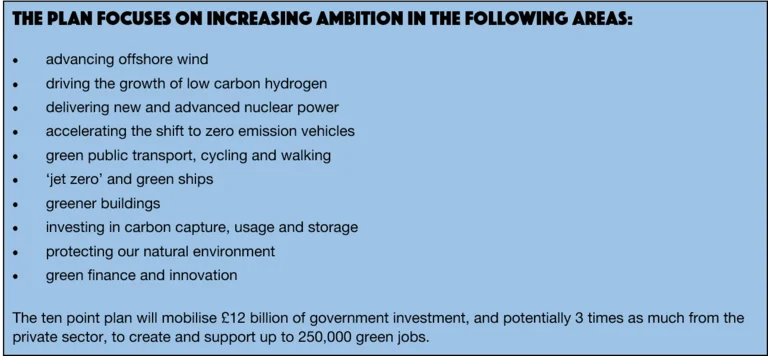18.11.2020
Against a highly pressurised backdrop of the Covid-19 pandemic and the end of the transition period, today the Prime Minister released his 10-point plan for a green recovery.

Today’s announcements comes as the UNFCCC Race to Net Zero Dialogues and the Climate Dialogues are taking place during November, one year ahead of the CoP26 in November 2021.
These are charting how entire sectors are already rapidly transitioning to a zero-carbon future. In addition, the UK is preparing to announce its Nationally Defined Contribution to the 2015 Paris Agreement. Never have the stakes been higher for the UK, as one of the global leaders in Climate Action, to show that it is also taking action at home.
The announcement emphasises the need to reduce our emissions and move to a greener resilient economy faster. It is a very welcome, firm commitment that marks a turning point in the effort that the UK is making to achieve its net zero by 2050 target. But what does it mean for manufacturers?
Now is the time to plan and put strategies in place
Turning the UK into the world’s number one centre for green technology and finance
As Make UK found in its recent Innovation Monitor: Bouncing Back Smarter, there are major gains to be had from investment in innovation and scaling up of new, smart technologies. When it comes to the new green technologies announced today, it will be our sector’s engineers who will conceive, realise and develop the R&D projects across the country for each of these. They will help spread their expertise, commissioning more projects and offering maintenance and consulting services around the world.
Moreover, the UK will lead by example by applying new green finance principles which companies will follow to investors in selecting the sectors and businesses doing the right thing.
Creating and supporting thousands of highly skilled and rewarding jobs
The UK manufacturing sector is poised to contribute to the creation of tens of thousands of high value green jobs in the country’s hardest hit areas, to make the green products and provide the services needed for a net zero future. Training in digital skills goes hand in hand with the adoption of future green technologies, which will in turn bring high value jobs. There will be job roles from the shop floor to board level and plenty of opportunities for young people to move into sectors such as manufacturing. There are opportunities to be had with the next generation being digital natives and more in tune with the sustainability and climate change agenda. Now is the time to showcase that our industry is both digital and green.
The green agenda can support the levelling up agenda
Regions will be able to develop the solutions matching their capabilities, which have the opportunity to level up our hardest hit areas. If fairness principles are applied no-one will be left behind and everyone will have a chance to contribute to building our country ‘cleaner, greener [and] more beautiful’, and more resilient.
Today’s announcement should give industry confidence to invest in green technologies but it can’t do it alone
The Prime Minister’s 10 point plan is exactly the signal that our manufacturing industry needs to have the confidence to invest in these clean technologies of the future that will enable us to make a low-carbon economy a reality. But the manufacturing sector cannot do this alone and the government must play its part by providing support to infrastructure projects and fair market conditions.
For manufacturers to be able to make their products and have a market to sell them in, the right level of infrastructure for public and private transport, heating, power generation and natural and industrial carbon sequestration will need to be available beforehand.
Government should therefore support investments in major infrastructure projects such as power generation, transport, and carbon capture and sequestration. Upcoming research from Make UK has found that 45% of manufacturers want to see infrastructure projects focusing on green energy in order to support manufacturing. Moreover, when deciding what infrastructure the country should invest in to support manufacturing, 27% of companies said ensuring infrastructure is green and sustainable.
For our energy intensive industries, industrial decarbonisation options may be a barrier to the uptake of green solutions due to high electricity pricing in the UK, which unless addressed will have an ultimate impact on net zero targets.
SMES, which represent a vast majority of the manufacturing sector, , will also need help with grants, fiscal incentives and rewards, as well as education on how to get started before and during the transition. Make UK’s report – towards a net zero economy showed that small businesses in particular are looking for advice and information.
There should be quick wins that can be made as manufacturing sites represent a formidable surface of rooftops for solar heating, of carparks for EV to recharge their batteries and of gardens waiting to be planted with trees.
We need a clear, robust and coherent industrial policy landscape
It is essential that Government builds on these good intentions with a clear, robust and coherent industrial strategy that focuses on building a strong industrial base and rightly puts manufacturing at the heart of this strategy.
Make UK and the manufacturing industry stands ready to demonstrate and explore adapted solutions for our manufacturing sector’s contribution to the delivery of the government’s ambitious green recovery plan.
